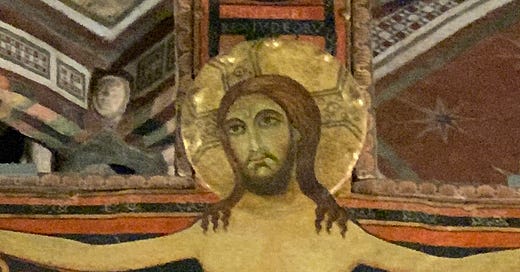How to Receive Holy Communion One of the books that dramatically changed my life and thinking was about this gospel lesson in Luke. It was called Dining in the Kingdom of God, by Father Eugene LaVeridiere. It was all about the Eucharist in the book of Luke. There is a reason why the feeding of the five thousand appears in all four gospels. This story is not about the food, but about what Jesus did. Jesus took bread, gave thanks, broke the bread, and gave it to his disciples. LaVerdiere noted that any time you see this four-fold pattern in the Bible, you are seeing the "eucharistic action." Jesus does this in all the feeding miracles, He does it on the eve of the Passover. He does it in Emmaus. He does it on the seaside. The early believers did it daily on Solomon's Portico. Paul did it on a ship and the food mulitplied, and Paul explains it in I Corinthians 11. This day we remember the Body and Blood. The Body was offered, it was blessed and dedicated, it was broken, and it was give to us. As a young person in the Episcopal church I was taught a deceptively simple rhyme crafted by Queen Elizabeth I: Twas God the Word that spake it. He took the Bread and brake it. And what the word did make it, That I believe, and take it. God the Word made flesh took bread, gave thanks and declared over it a new reality, and in the breaking of that bread, the reality was released to us, and we can receive it. Jesus in John six, on explaining the feeding of the multitudes said, if you eat my flesh and drink my blood you will have life within you, and I will raise you up on the last day. So this bread and this wine is the source of eternal life. In the Tuesday Prayer meeting we are revisiting the teaching of Agnes Sanford. It might come as a surprise to some people that Agnes Sanford was the wife of one of the most traditional and conservative Episcopal priests in the country. She went to a very traditional church, and she led a prayer group that saw miracles. We use her prayer principles in our prayer group, and I have had the good fortune to have known several people who worked and traveled with her. Today I want to share some of the insights about the Eucharist I learned from my priest and confessor Father Al Durrance, who was closely associated with Agnes Sanford through the Camps Farthest Out. Father Al, although spirit filled and a worker in miracles, was also one of the most traditional priests I have ever known. Before church on Sunday, Agnes Sanford's prayer group would go into the church, find a place and kneel in silence. They didn't have a prayer meeting, but rather took positions quietly around the church. In thought, they would come into agreement and begin to be channels of the light and love of God for the minister, then the choir, then they would pray for every person coming into the church to have an encounter with Jesus and to fully receive the Body and Blood of Christ at Holy Communion. Then they would each pray for individuals in the church. They did this every week, and people were drawn to the church, and many, many people were sovereignly healed, without ever praying a prayer over them. Following this example of Agnes Sanford and Father Al, let's unpack what happens in our gathering each Sunday, and how to rightly receive the Body and Blood of Jesus. Jesus took bread, gave thanks, and broke it. These three actions are very important, and they are rooted in the Passover seder. In Christianity, we receive the bread, and in a traditional church we receive the tithes and the offerings when the bread is brought to the altar. As we say in the prayer every week (and I say "we" because we are all praying this prayer, even if I am the one saying the words) that we are presenting these gifts and our selves as an offering to God. So first, the bread is a thank offering. Then Jesus gave thanks. He said a "baruch" blessed are you Lord our God. And in the Last Supper, he spoke words over this bread: This is my body, This is my blood. Each Sunday, like all the churches around the world, I use the words given to us by Saint Paul in I Corinthians 11. We are making a declaration over the bread and wine. This is one of the reasons I believe in the power of declarations. I will tell you a little secret, every time I take the bread, hold it up, and speak these words, I feel something happen in the bread. I feel a vibration. Father Al Durrance said that the bread is infused with the light of God. And then I lift the bread up. This part of the prayer is called the elevation, and it happens three times, at the words of institution, and at the end. And in my former world, that is the moment we would ring the bells. The bread is lifted up as a wave offering before the Lord, just like in the tabernacle in the wilderness. And then this bread and wine is consecrated, and we ask the Holy Spirit to make this bread already infused with the light by the word spoken over it, to be the Real Presence of Jesus. It is the Holy Spirit who activates the Word we have spoken. And in the marriage of the Word and Holy Spirit, we again experience the Word made flesh, the Incarnation. This is again, an experience of the Holy Trinity. The Father gives, the Son activates, the Holy Spirit manifests. As you know, this is the place in our community when I invite you to hold your bread up on the camera. This is an act of intention. The Eucharist in our dispersed community, by the Word and Holy Spirit is not limited by time and space, and the same power and presence of God here where I am is flowing with you. There is no limitation. In many places we are one body. It is a prophetic sign of the whole Body of Christ across the earth. And now, this bread and wine are infused and energized by the full presence and power of Jesus. In order for us to release this power, the bread must be broken. The breaking of the bread is the moment when the light is released. This breaking of the bread is central to the sacrament. So we break the bread and the light is released. This is also from the Passover seder, when the host breaks the bread and says "Yachatz!" Broken. And so, in the New Testament, the phrase "Breaking of the Bread" is used for the Eucharist. So now we need to receive the Body and Blood. Jesus took the bread, gave thanks, broke it, and gave it to the disciples. Paul admonished the Corinthian believers to not receive the Body and Blood in an unworthy manner. Protestants tend to stop the sentence in the middle, after "examine yourself" and make this examination a moment of introspection and focus on sin. Paul instead says, examine yourselves because you must discern the body. This is not bread. And you are not having fellowship with people. You are now consuming the flesh of Jesus (these are the words of Jesus) And the people around you are now his body. This is why Jesus said, where the body is the vultures gather. Yes, Jesus called us vultures. We are gathering to feed on him. Where there is no Body of Jesus people stop gathering. Because people are hungry, and they are looking for food. It is very simple. At this moment of receiving you are one in him and one with each other. And when you do this you are proclaiming his death, and receiving the seed of eternal life that will raise you up on the last day. It is not about you and your sin. Looking at your sin takes the attention away from Jesus and back to you. And when you do this, you are grieving the Holy Spirit. This is why so many churches have so little power. And because of this, many people do not receive healing but rather death into their bodies. This is one of the reasons there is so much cancer in the church, because the cells of the body which are made to multiply and perform a holy function become malignant. The physical world often reflects the world of the spirit. Father Al noted a connection between unforgiveness anger and resentment and cancer. He said he recognized a pattern of eighteen months between a crisis or trauma and cancer if the unforgiveness and bitterness was left to fester. So we take a moment, hopefully to recognize that this is the body of Christ and we are among the body of Christ. They are inseperable. As I mentioned earlier, the host is now full of the light of God. Some fortunate people sometimes get a revelation of the light and see it. If you can't see it, use your holy imagination, and see the bread and wine full of light. As you consume the body and blood see that light come into your body. Ask the Holy Spirit to infuse your body with his light, so that the light that is already in you, can become stronger and more full. And sit until you see the light permeating every cell of your physical body. And in this moment, you can experience healing and wholeness. In the moments where I am free to receive without pressure, often the Lord will speak to me and give me clarity. And in this moment, the realities of what we have been speaking about become tangible. You are now the temple of the Holy Spirit. The Body of Jesus is in you, and you are in him. He is abiding in you as you receive his Body and Blood and that life becomes life for the world. You are now empowered and enabled to be Jesus in the world for others. I have encountered many extraordinary moments with people through the Holy Eucharist. Last January I was at the Spirit Wind Centre and Jim asked me to celebrate Holy Communion. I was a good Boy Scout, so I was prepared with my travel linens and a host. The folks in his church were a little suspicious of me when I began setting the altar for a mass. When I got to the words of institution, one of the women in the group got a shocked look on her face. She then leaned forward and paid attention. And then when I broke the bread, she fell back in her chair. Afterward she said that she saw the light of God come on the host while I was saying the prayer, and that it was all over me. And then when I broke the host, it was released and began to slosh over everyone in the room. And she was hit with a wave of the power coming out of the sacrament. Classical theology says that in the Eucharist we receive infinite grace in Holy Communion. That is very hard to experience. I hope this teaching helps you encounter and receive that grace in a more profound and effective way. Amen.
How to Receive Holy Communion
Receiving the Light and Love of God.
Jun 23, 2025












Share this post